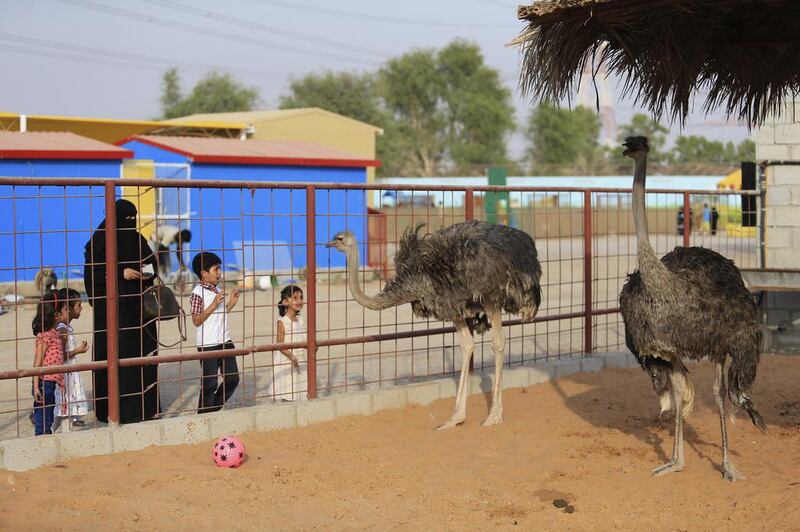RAS AL KHAIMAH // RAK Wildlife Park officials hope to raise enough money to carry out a two-year expansion and upgrade of the attraction in the wake of a law making it illegal to keep exotic animals as pets.
Ninety per cent of the animals at the centre, from big cats to primates, are rescues – are liberated from people’s homes or even visiting circuses.
The park is expecting a lot of animal dumping as the ownership law comes into place.
“People are realising now that keeping a lion or tiger in an apartment or even a villa is impossible,” said Zara Hovelsas, wild animal welfare director for the Middle East Animal Foundation, who is assisting with the renovations.
“Even by eight or nine months, a tiger or lion becomes unruly and it’s impossible to keep them. Many are simply discarded when they get too big.”
The one-million-square-foot RAK Wildlife Park is run by Emirati Jasem Ali, a retired police general, whose “love for nature and for animals” inspired him to launch the shelter and rescue some of the many wild animals brought in illegally, raised in farms, homes, kept in pet shops and abandoned.
For now, the two-year renovation project, which will cost Dh5 million, is being funded by Mr Ali, with some support from Sheikha Fatima bint Rashid bin Saeed Al Maktoum.
It is a huge undertaking but Mr Ali said the biggest priority was air conditioning and “ensuring the animals evolve in the right climate”.
The park, near RAK Airport, opened in 2014 as RAK Zoo.
Ms Hovelsas changed the name to RAK Wildlife Park as she wanted it to reflect the sanctuary it provided for its diverse array of animals rather suggest a place of cruelty and captivity.
She also wants better labelling of the enclosures because, she said, many visitors were confused as to why the animals looked in bad shape, unaware of their journey before reaching the sanctuary.
“The two tigers we rescued from the circus visiting the UAE came to us in a very bad condition,” she said.
“We need people to understand the background and that we’ve taken them in as a sanctuary, and that they’re not being mistreated with us.”
Mr Ali said it was very important people understood what they were doing at the wildlife park.
“We rescue the animals to ensure they can continue their lives in an environment that is safe for them,” he said.
About 60 per cent of the visitors to the park are tourists. During the cooler months up to 2,000 people visit every week.
Mr Ali said he would “really like the support of the tourism authority”.
Mohamed Loojab, assistant director of tourism standards at the RAK Tourism Development Authority, said it will be some time before the centre will be licensed.
“Following a site visit conducted in late 2015, the authority communicated its feedback to the owner of this private venture,” he said.
“This feedback outlined our assessment that the facility did not meet the basic international standards of a zoo or park and, therefore, does not currently meet our official visitor attraction standards.”
However, Mr Loojab said: “We can share detailed guidelines on how to meet the standards the authority requires.”
It may be 2018 before the new law on animal ownership is -fully enacted, in the meantime there will be much to do.
“It’s important for the region to raise this awareness about animals and protecting them,” said Mr Ali.
mswan@thenational.ae






